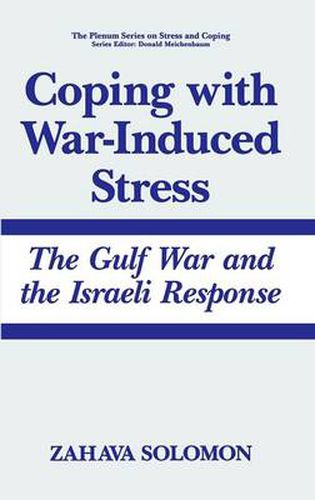Readings Newsletter
Become a Readings Member to make your shopping experience even easier.
Sign in or sign up for free!
You’re not far away from qualifying for FREE standard shipping within Australia
You’ve qualified for FREE standard shipping within Australia
The cart is loading…






This title is printed to order. This book may have been self-published. If so, we cannot guarantee the quality of the content. In the main most books will have gone through the editing process however some may not. We therefore suggest that you be aware of this before ordering this book. If in doubt check either the author or publisher’s details as we are unable to accept any returns unless they are faulty. Please contact us if you have any questions.
I n the wake of an earlier book (Solomon, 1993), this new work, Coping with War-Induced Stress: The Gulf War and the Israeli Response, promises to make Zahava Solomon a modern maven with respect to the psychologi cal effects of war. Dr. Solomon is a high-ranking officer, serving as a psychiatric epidemiologist in the Mental Health Department of the Is raeli Defense Forces Medical Corps. She also teaches at Tel Aviv Univer sity. The earlier book dealt with the reactions of the Israeli Defense Forces to the 1982 war in Lebanon, which divided the population of Israel concerning its wisdom and justification. The new book deals with the emotional consequences of the United Nations effort against Iraq after its invasion of Kuwait. Because Israel agreed not to participate actively so as not to endanger the fragile Arab coalition against Iraq, it was in a sense a nonwar-as Solomon refers to it-yet with many fea tures of a war. Although they had quite limited casualties, largely in the Tel Aviv area, the Israelis faced the actuality of damaging Scud missile attacks and the threat that these missiles could not only be targeted to much of Israel but also carry poison gas to other Israeli cities. Solomon has written a fascinating book about this crisis in Israeli life.
$9.00 standard shipping within Australia
FREE standard shipping within Australia for orders over $100.00
Express & International shipping calculated at checkout
This title is printed to order. This book may have been self-published. If so, we cannot guarantee the quality of the content. In the main most books will have gone through the editing process however some may not. We therefore suggest that you be aware of this before ordering this book. If in doubt check either the author or publisher’s details as we are unable to accept any returns unless they are faulty. Please contact us if you have any questions.
I n the wake of an earlier book (Solomon, 1993), this new work, Coping with War-Induced Stress: The Gulf War and the Israeli Response, promises to make Zahava Solomon a modern maven with respect to the psychologi cal effects of war. Dr. Solomon is a high-ranking officer, serving as a psychiatric epidemiologist in the Mental Health Department of the Is raeli Defense Forces Medical Corps. She also teaches at Tel Aviv Univer sity. The earlier book dealt with the reactions of the Israeli Defense Forces to the 1982 war in Lebanon, which divided the population of Israel concerning its wisdom and justification. The new book deals with the emotional consequences of the United Nations effort against Iraq after its invasion of Kuwait. Because Israel agreed not to participate actively so as not to endanger the fragile Arab coalition against Iraq, it was in a sense a nonwar-as Solomon refers to it-yet with many fea tures of a war. Although they had quite limited casualties, largely in the Tel Aviv area, the Israelis faced the actuality of damaging Scud missile attacks and the threat that these missiles could not only be targeted to much of Israel but also carry poison gas to other Israeli cities. Solomon has written a fascinating book about this crisis in Israeli life.